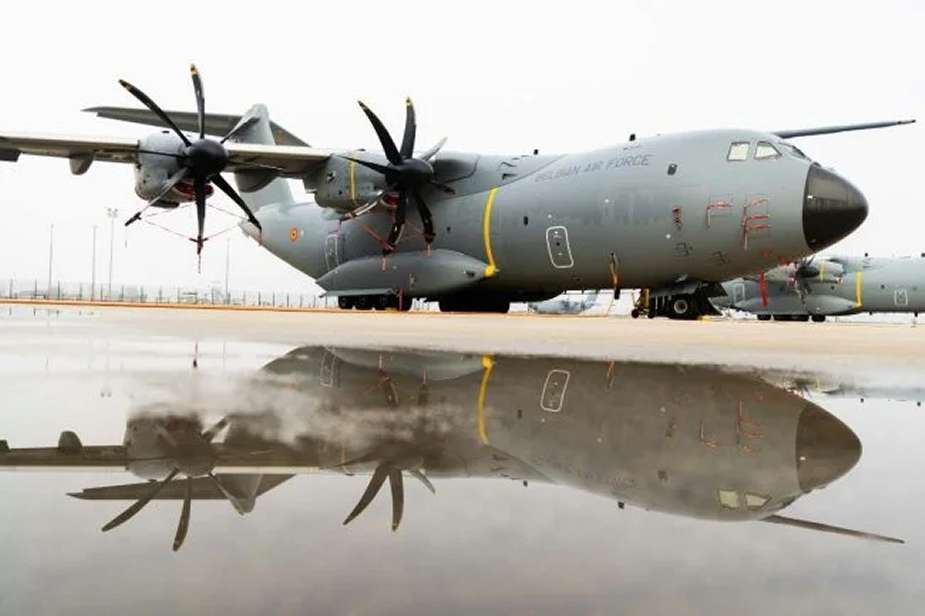Breaking news
Belgian and Luxembourg air forces receive final Airbus A400M Atlas.
The last Airbus A400M Atlas was handed over to the Belgian and Luxembourg air forces at Melsbroek Air Base (east of Brussels) on February 20, 2024, concluding an order for eight units managed through OCCAR.
Follow Air Recognition on Google News at this link
 The last Airbus A400M Atlas was handed over to the Belgian and Luxembourg air forces at Melsbroek Air Base (east of Brussels) on February 20, 2024 (Picture source: OCCAR)
The last Airbus A400M Atlas was handed over to the Belgian and Luxembourg air forces at Melsbroek Air Base (east of Brussels) on February 20, 2024 (Picture source: OCCAR)
Ministers of Defense Ludivine Dedonder of Belgium and Yuriko Backes of Luxembourg emphasized the close collaboration between their nations in this A400M acquisition and operation project, which saw seven aircraft allocated to Belgium and one to Luxembourg.
Belgium acted as the representative for Luxembourg in the OCCAR program involving six nations, overseeing the procurement of the A400M aircraft. Out of the eight aircraft ordered, which commenced delivery in November 2023, seven were delivered to the Belgian Air Component and one to the Luxembourg Army Air Component.
Powered by four Europrop TP400-D6 turboprop engines, this aircraft delivers exceptional performance, including impressive cruise speeds and a maximum range exceeding 4,800 nautical miles. With a maximum payload capacity of approximately 37 metric tons, the A400M can transport a diverse array of cargo, from vehicles to troops and humanitarian aid supplies. Its Short Takeoff and Landing (STOL) capabilities enable operations from semi-prepared airstrips, enhancing operational flexibility and access to remote or austere locations.
Equipped with state-of-the-art avionics systems, including a modern glass cockpit with digital displays, the A400M ensures enhanced situational awareness and operational efficiency. Advanced mission systems, such as integrated self-protection measures and communications equipment, guarantee mission success and crew safety in challenging environments. Cargo handling systems, such as the rear loading ramp and pressurized cargo hold, facilitate rapid loading and unloading of various cargo types, streamlining logistics operations.
Belgium and Luxembourg's procurement of the A400M was facilitated through collaborative efforts, leveraging the resources and expertise of multiple nations to optimize cost-effectiveness and operational capability. Participation in initiatives like the OCCAR program underscores a commitment to enhancing interoperability and cooperation among allied nations in defense procurement and operational activities.
What is OCCAR?
OCCAR stands for Organisation for Joint Armament Cooperation. It is an international organization that facilitates collaborative defense procurement and armament programs among its member states. OCCAR was established in 1996 with the aim of promoting cooperation and interoperability among European nations in the development, acquisition, and through-life support of defense systems and equipment.
The primary objectives of OCCAR include:
* Pooling Resources: OCCAR allows participating nations to pool their resources and expertise to jointly develop and procure defense equipment. By combining efforts, member states can achieve cost savings, improve efficiency, and enhance the capabilities of their armed forces.
* Harmonization of Requirements: OCCAR facilitates the harmonization of requirements among member states, ensuring that defense systems and equipment meet common standards and interoperability requirements. This helps to streamline procurement processes and foster greater collaboration among participating nations.
* Project Management: OCCAR provides project management expertise and support throughout the lifecycle of defense programs, from initial development through to production, delivery, and in-service support. This ensures effective management of complex defense projects and helps to minimize risks and delays.
* Contracting Authority: OCCAR serves as the contracting authority for multinational defense programs, negotiating and managing contracts on behalf of participating nations. This helps to simplify procurement procedures and reduce administrative burdens for member states.


























